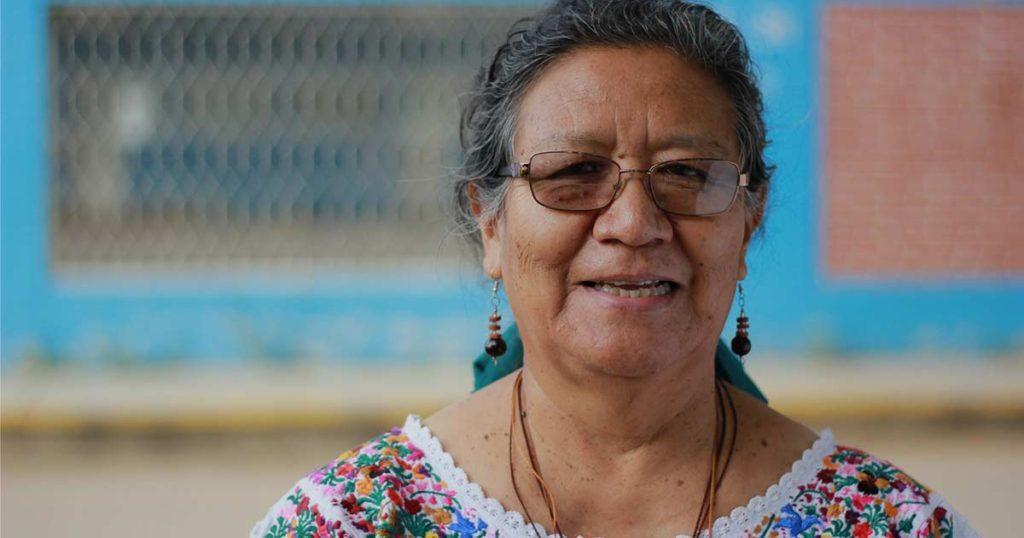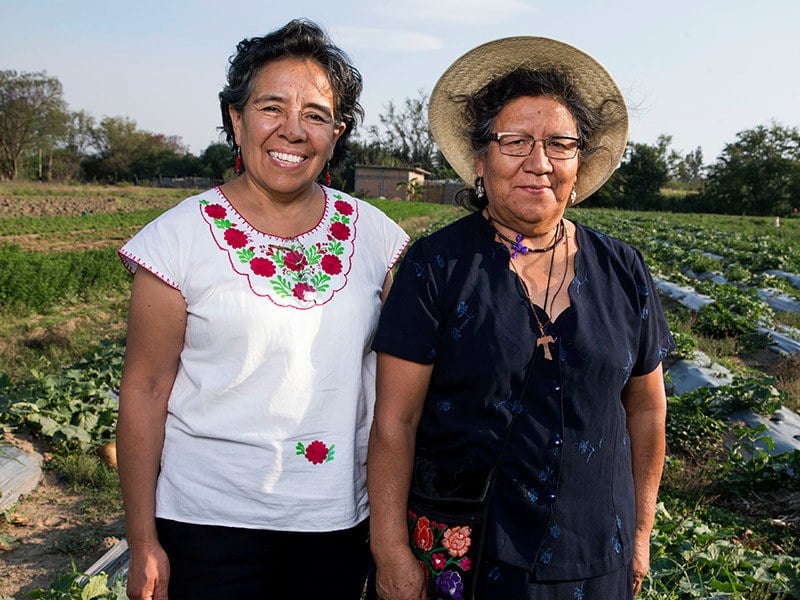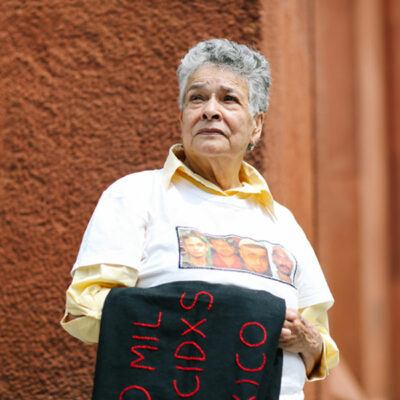The AJWS team honors the extraordinary life and work of Zapotec activist Carmen Santiago Alonso, who died this week at the age of 69. Carmen was a dear friend and partner of AJWS who touched countless lives in more than four decades of organizing to defend human rights in Mexico. She was the founder and Executive Director of the Center for Indigenous Rights Flor y Canto, a longtime AJWS grantee dedicated to promoting the culture, rights and self-determination of the Indigenous Peoples of Oaxaca’s Central Valleys—the region where Carmen was born and raised.

Throughout her life, Carmen felt called to activism. In her teenage years, she migrated from her hometown San Antonino Castillo Velasco to work as a day laborer in Mexico City, where she learned about community organizing and advocated for social benefits for workers. At 26, she became a nun of the Christian liberation theology movement and dedicated her life to serving others. She also had a deep love for Mother Earth, and she credited her elders for inculcating in her an understanding of the sacredness of earth and water, and a passion for Zapotec land, language, culture and people.
AJWS’s President and CEO, Robert Bank, remembers her for her powerful contribution to justice:
“The world has lost a remarkable woman whose spirituality and activism inspired me personally, all of us at AJWS, and all who benefited from her vision.”
Working hand in hand to defend water
Carmen’s life’s work was to defend the Zapotec people’s autonomy over their natural resources, especially water—the life-sustaining force that nourished their crops, traditions and way of life. When the government severed access to this vital resource, she joined and led a movement to resist.
For thousands of years, Indigenous communities lived sustainably in the drought-prone Central Valleys of Oaxaca by digging wells and conserving water during times of drought. But with the rise of Industrial farming and mining, this delicate ecosystem became severely strained and Indigenous farmers struggled to grow their crops in a much dryer landscape. In 2006, Mexico’s national water authority, CONAGUA, banned water extraction for Indigenous agriculture in the valleys altogether, while continuing to allow water for profitable ventures like silver mining and industrial mezcal production. Fields across the valley withered and died.
The Indigenous communities were outraged because the ban severely limited any possibility to support their livelihoods. Moreover, it violated international agreements that recognize the right of Indigenous Peoples to be consulted in any proposed activities that impact their lands and way of life.
Carmen recognized this decision would affect life across Oaxaca’s Central Valleys, and began a long process of community organizing. She began to work hand in hand with 16 Indigenous communities—including the one she grew up in—and together they formed COPUDA (Coordinadora de Pueblos Unidos por el Cuidado y Defensa del Agua/ Coordinator of United Peoples for the Stewardship and Defense of Water). They set out to prove that not only should Indigenous Peoples have the right to use Oaxaca’s water and be consulted about it, but that they have the skills to restore the depleted aquifers for the entire region.
“Sowing Water” for Life
Carmen and Flor y Canto consulted with academic experts on water conservation on how to combine ancient and contemporary practices to capture Oaxaca’s rainwater and bring the land back to life. Carmen spearheaded environmental restoration efforts that planted 100,000 trees to capture moisture. And between 2005 and 2010, Flor y Canto and local volunteers dug 300 deep wells in 16 communities that captured that moisture and supplied water to thousands of people.

Slowly but surely, the water returned. In just 10 years, the aquifers were replenished, water in local wells increased, and the local groundwater returned to its healthy, sustainable level. If you stand in Oaxaca today and look around the rolling hills, you can see Carmen’s legacy everywhere—in the green of flourishing family farms. The people now refer to the Indigenous farmers and Flor y Canto as the “sowers of water” who have restored life to the Central Valleys of Oaxaca.
Defending Constitutional Rights
While this environmental restoration was in progress, Carmen and the communities appealed CONAGUA’s water ban in court, insisting on their right to be consulted. They brought expert witnesses to demonstrate the water-saving techniques they were using, proving that Indigenous Peoples are essential stewards of the land.
They were up against a formidable foe: Throughout the battle, Carmen and her team faced threats and harassment from private, corporate and government officials—but she refused to back down, because the lives of thousands of Indigenous people were on the line.
Carmen explained what inspired her to persist:
“We hope … the government will respect the voice of the peoples of COPUDA who for many years have fought for water … We only want to live freely and be respected.”
AJWS is proud to have supported this courageous effort, and we celebrated along with Carmen, Flor y Canto and COPUDA when they achieved their first victory in 2013. A municipal tribunal ruled that the water commission must consult with the farmers and give them a say in how water is allocated. It was a landmark victory—the first time anyone had challenged this powerful body, the first time CONAGUA had been made accountable to follow the law on Indigenous rights, and the first time that a Mexican governmental institution had recognized those rights.
In more recent years, Carmen and her allies took this case to even higher halls of power. In 2019, the federal government recognized the collective rights of the Zapotec communities to manage their water. And in late 2021, Flor y Canto successfully persuaded President López Obrador to sign a decree giving full control of water management to 16 Indigenous communities, which would allow them the full agency to cultivate and protect the land.
Since these victories, people all over Mexico have reached out to Flor y Canto for guidance on how to design a consultation process with the government that recognize the rights of Indigenous Peoples. And later this year, the President will visit Oaxaca to celebrate this momentous victory. While Carmen didn’t live to see this milestone, the leaders of COPUDA and Flor y Canto will feel her presence—and AJWS will continue to support their work into the future.
With a deep commitment to spirituality and a fearless disposition, Carmen Santiago Alonso inspired movements for justice—and, with her own hands, helped return the flow of life-giving water to the land that she loved. Among the many gifts she left as her legacy is a restored belief in what is possible for Indigenous Peoples. This legacy will live on in the organization she founded and the countless people who will carry Zapotec culture forward for the next generation.
May her memory be a blessing—may her memory be a revolution.

